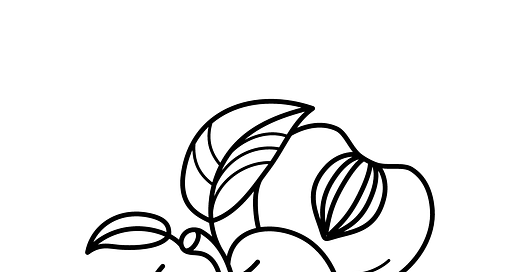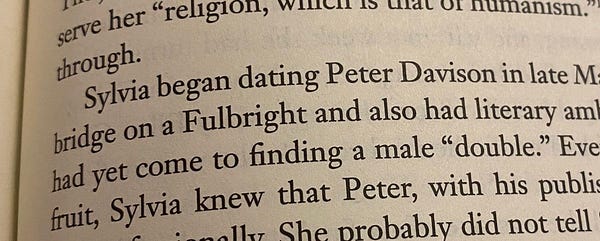Happy Friday, all!
Here’s what I have for you today:
Housekeeping
What I read last week
Quotations
On accessibility
Tweets
Housekeeping:
I have a poem out in Cream City Review this week:
& I have a new zine!
As always,
I’m also selling books—either lightly annotated or brand new.
Here are the categories you can choose from, if you’re into that:
Poetry
Prose
LGBTQ+
BIPOC
Hybrid/experimental
~~A surprise~~
Zines
Coffee table books
What I read last week:
Dear Memory, Victoria Chang
greater grave, jacq greyja
water/tongue, mai c. doan
“On Poetry & Accessibility,” Joshua Marie Wilkinson
“Shock and Blah: Offensive Postures in ‘Conceptual’ Poetry and the Traumatic Stuplime,” Sueyeun Juliette Lee
“Avant-garde Collaboration,” Housten Donham
On my to-read list now:
“Blackness and Poetry,” Fred Moten
Quotations:
I know this pain isn’t grief […] because I can feel it and identify its source.
-Victoria Chang
If I were acutely aware and awake to the world around me, there would be enough trauma and existential pain to last me a lifetime.
-Victoria Chang
Father, I am ashamed by how much I yearn. Father, I grieve in acres.
-Victoria Chang
And thus, she lit the temperature of my mouth. / And thus, she lit my breast subtle with light.
-Erin Moure, “The Lettuce Smeller”
Forgetting me is what you do / so you don’t have to look at yourself.
-Tarfia Faizullah, “The Poem You’ve Been Waiting For”
My love / for nature is like my love for most things: / fickle & theoretical.
-Tarfia Faizullah, “My Love for Nature”
There are many ways to freedom, with a hymn’s / lithe blade or a butcher knife.
-Phillip B. Williams, “Mastery”
He speaks / in sunsets.
-Phillip B. Williams, “Mastery”
It must be winter in me.
-Phillip B. Williams, “Mastery”
O, choosy god, choose me.
-Phillip B. Williams, “Mastery”
I am interested in a poetics of listening and looking—of responsiveness.
-Kristi Maxwell, “In/An Addition: An Evolving Poetics”
Perhaps performing silence, dismemberment, and cultural destruction is more welcomed than performing outrage. Perhaps it depends on whose body is performing. And for whom.
-Sueyeun Juliette Lee, “Shock and Blah: Offensive Postures in ‘Conceptual’ Poetry and the Traumatic Stuplime”
I’m regularly disappointed by the often petty criticisms directed at conceptual poetry (such as Calvin Bedient’s critique of “head poetry”). At the same time, I’m disappointed in the claims (and much of the work) by conceptual writers, many of whom regularly engage in insincere and self-aggrandizing apologetics when writing about conceptualism.
-Housten Donham, “Avant-garde Collaboration”
That typical phrase that “All art is political” is invested with profound truth: we live in a culture in which all of our actions, including art-making, are formed and informed by the political.
-Housten Donham, “Avant-garde Collaboration”
The banks thicken at low tide. The river
decreasing year within year. Out slowly.
I expose your thigh and want to fill you.
-Saretta Morgan, “Dearth-Light”
Tell me again. Your names
for what we become.
-Saretta Morgan, “Dearth-Light”
a history of drowning ourselves in the river: // autonomy or death, / we resist capture.
-mai c. doan
On accessibility:
If your primary concern is your work being “accessible,” I recommend you revisit that. The poets I despise most (IYKYK) are those whose poems are totally sanitized, lacking any personal detail or, worse, containing stunning lyricism and then finishing off the poem with a neat lil didactic statement that totally ruins the poem at large.
I could go on & on about this and—as former students will tell you—I have.
But here are some writers with a little more cultural capital who agree with me:
Would we ask composers to be use fewer notes or for dancers to rely only on familiar movements? We may not enjoy or even understand what they do, but that’s hardly a call to relegate them to preapproved melodies or expression. If artists aren’t encouraged to expand the horizon of what’s possible for human imagination and experience, perhaps we are better off leaving that to Hollywood or in the care of our elected officials.
-Philip Levine
We are told, again and again, that for poetry to be digestible in a broadly appealing way, apparently it must be poetry paired up with something else. For Natasha Tretheway to be invited to Fresh Air, there must be a pitch; poetry beside a familiar topic. “Poetry plus” is what Marjorie Perloff calls this.
For Tretheway, that means poetry plus her biracialness. Which allows Terry Gross to ask, “What does [Obama’s election] mean to you?” For former poets laureate it is poetry plus the homelessness of a brother (Robert Hass) or poetry plus the death of a parent (W.S. Merwin); and really why should this surprise us? It just exploits the fact that poetry can speak to literally anything. And so long as the host sticks to the topics we are safe with (politics, death, family) then we will avoid having to talk about what animates poetry (the language itself, of course). So much so, perhaps, that for Billy Collins, it is poetry plus accessibility itself. Poets on “Fresh Air” are treated like 21st-Century mystics, with specialized access to their own experience. There is so little mention of language in these interviews that you might forget that poets work with words at all. Yet even Collins, the author of a book called The Trouble with Poetry, says that this talk of accessibility is now like “nails on a blackboard” to him.
-Joshua Marie Wilkinson, “On Poetry & Accessibility”
When we reduce the discussion to the terms of “access” and “accessibility,” what is implied through these words is that entry has been barred, that we are prevented from experiencing the meanings of these difficult poems, despite the fact that many of us are literate adults. When the word “access” is used in this way, rhetorically it stages the poem as the esoteric structure of a willful obscurantist who would prefer that you don’t even bother until you have read your way through the library. But this is not the way of poets I know. Most of us crave some small readership, without having to dilute or summarize the verses we’ve worked solitarily to invent.
-Joshua Marie Wilkinson, “On Poetry & Accessibility”
Why should things please a large audience? And isn’t claiming that the work is too intellectually demanding also saying a majority of people are stupid? Different poets will always have different audiences. Some poets appeal to younger people, some to thousands, one or two to millions, some to older people, etc. If you have four readers who you truly touch and maybe even influence, well then that’s fine. Poetry is a calling. You are called to write and you follow.
-Susan Howe
We don’t need to unpack a poem for its pleasures to be visited on us.
-Joshua Marie Wilkinson, “On Poetry & Accessibility”
I think this debate about poetry […] resurfaces zombie-like, again and again, because poetry is a language art like no other.
-Joshua Marie Wilkinson, “On Poetry & Accessibility”
Approachability is often tedious, full of expected turns and unsurprising language. […] It’s didactic, redundant, and poorly measured, to boot.
-Joshua Marie Wilkinson, “On Poetry & Accessibility”
I am a selfish, complicated person, and I want a poetry far more sophisticated, imaginative, and contradictory than I am. I don’t need to see myself reflected in a poem. If I wanted that, I would sit around reading my own poems to myself—which, occasionally, I do.
-Joshua Marie Wilkinson, “On Poetry & Accessibility”
The writer’s real dishonesty is to give an easy paraphrase of the hard truth.
-Randall Jarrell
I agree with Billy Collins, when he says, “once the reader gets into the poem, I’m hoping that less accessible things start happening as the reader is moved into worlds that are a little more challenging, a little more hypothetical, and a little more mysterious.” Even for Billy Collins—I’m sort of stunned to say, I’ll admit—accessibility itself is really just a ruse, a Trojan horse to get to the more complicated activities of the poem.
-Joshua Marie Wilkinson, “On Poetry & Accessibility”
Tweets:





Have a great weekend,
-Despy Boutris








